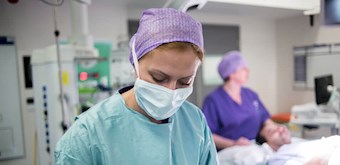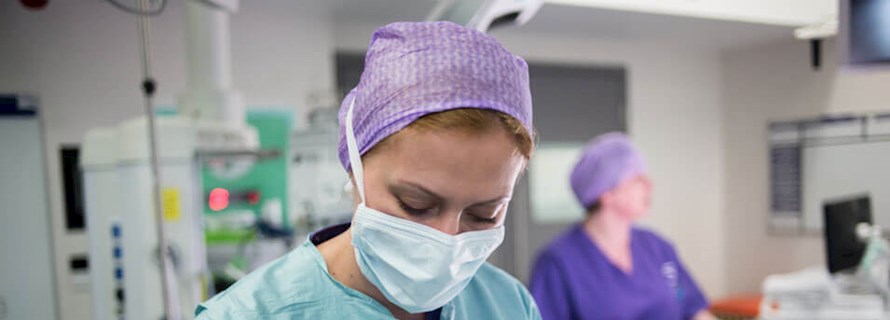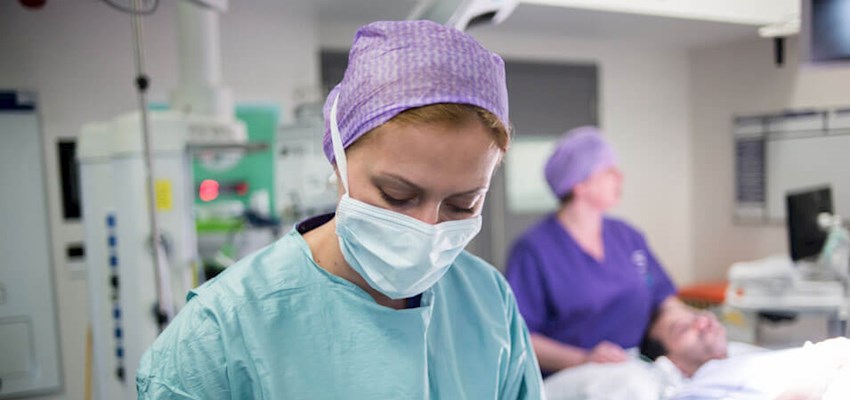Cholecystectomy
Gallbladder removal
If you need to have your gallbladder removed, HCA UK provides open cholecystectomy
What is a cholecystectomy?
Your gallbladder is a small organ (body part) that stores bile, a liquid which helps you digest fatty food.
Sometimes small stones called gallstones forms inside your gallbladder. These often cause no symptoms and you may not even know you have them. However, they can sometimes block the flow of bile and irritate your gall bladder (acute cholecystitis) or pancreas (acute pancreatitis).
If you get these conditions, the symptoms are:
- sudden, very severe tummy pain
- nausea and vomiting
- jaundice (yellowing of the skin and whites of the eyes)
Surgery to remove the gall bladder (cholecystectomy) is the most effective treatment option.
You can live without a gallbladder as your liver will still make bile.
Sometimes small stones called gallstones forms inside your gallbladder. These often cause no symptoms and you may not even know you have them. However, they can sometimes block the flow of bile and irritate your gall bladder (acute cholecystitis) or pancreas (acute pancreatitis).
If you get these conditions, the symptoms are:
- sudden, very severe tummy pain
- nausea and vomiting
- jaundice (yellowing of the skin and whites of the eyes)
Surgery to remove the gall bladder (cholecystectomy) is the most effective treatment option.
You can live without a gallbladder as your liver will still make bile.
Need to know
-
What happens during surgery? icon plus
Your GP or consultant will assess your condition and depending on your symptoms (especially if your gallstones are causing pain), a cholecystectomy will be carried out.
There are two types of cholecystectomy – laparoscopic (keyhole) and open. This type of operation is usually carried out laparoscopically, however, upon discussion with your consultant, and depending on your condition, it may be planned that you have an open cholecystectomy, which is a larger cut in your abdomen, to remove your gallbladder.
Compared to keyhole surgery, the recovery time for open surgery is usually longer. -
How to prepare icon plus
Open cholecystectomy is generally a very safe procedure. However, as with any surgery, there are some risks and side effects involved. Your consultant will explain these to you and answer any questions you might have.
Open cholecystectomy is carried out under a general anaesthetic which means you'll be asleep during the provedure. Afterwards, the area will be closed with stitches or staples.
We will let you know in advance how long to avoid eating and drinking before your surgery. -
After surgery icon plus
After the procedure, you will be taken to the recovery unit, where our dedicated team will look after you. You will be given pain relief medication if needed.
After your open cholecystectomy, you will usually be required to stay in hospital for three to five days. Your consultant or specialist nurse will let you know when you can leave the hospital.
You will be advised on how to manage your recovery and when you can get back to your usual daily routines, but most people make a full recovery within six to eight weeks. Some patients may also experience bloating or diarrhoea after surgery, which usually improves within a few weeks.
Our surgeons
We're proud to work with leading surgeons across a range of medical fields, whose skills are matched by their integrity and compassion.




Our locations
From complex surgery to straightforward procedures, we provide exceptional care across our network of hospitals, outpatient centres and specialist clinics.
-
The Wellington Liver & HPB Unit
The Wellington Liver & HPB Unit
North Building, Circus Road, St John's Wood
London NW8 6DP
Book an appointment
Our team can help with any enquiries or you can make an appointment with one of our experienced consultants.
Call us today
020 7079 4344
This content is intended for general information only and does not replace the need for personal advice from a qualified health professional.